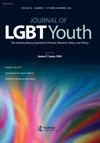我们的孩子是你们的学生:LGBTQ家庭大声疾呼
IF 1.8
Q1 SOCIAL SCIENCES, INTERDISCIPLINARY
引用次数: 2
摘要
尽管有许多教学资源可以帮助教育工作者了解LGBTQ家庭及其子女的现实,但塔拉·戈尔茨坦的新书以这些家庭及其经历、斗争和成功的故事为基础,在如何创建一个更加公正和公平的教育体系方面,有很多东西可以教给我们。在过去的两年里,我试图将有关LGBTQ家庭和儿童的内容纳入马耳他大学关于性和课程的研究单元,该单元面向学前教师和学习支持教育工作者。为此,戈尔茨坦的书《我们的孩子是你的学生:LGBTQ家庭畅所欲言》(2021)已被证明内容丰富,易于讨论教育学中这一经常被忽视的元素的各个方面。戈尔茨坦是多伦多大学安大略教育研究所的性别、性和学校教育教授。她还是一位民族志学者和戏剧作家。这本书讲述了Tara Goldstein和她的团队在2014年至2020年间对LGBTQ家庭进行的37次采访的讨论。戈尔茨坦的书分为五章。在题为“从匿名到证词和自传”的第一章中,戈尔茨坦偏离了为什么包容LGBTQ父母是一个人权问题的解释,同时在意识形态上定位了个人和制度实践中的压迫和歧视循环,需要通过经验来应对(第19页)。戈尔茨坦曾支持匿名教育法,这使她能够通过鼓励学生“通过匿名回复写作”来表达自己,从而打破课堂上恐同和恐变性的沉默(第123页)。这最终使她发展了一种证词和自传的教学法,前者是“人们讲述自己的经历的故事,并与经历边缘化和压迫的群体或社区联系在一起”(Crosby&Brinton,2019,第233页)。当这些故事没有共同联系时,它们就是自传(Goldstein,2021,第22页)。这本书的第二章标题为“这是我们的家庭:逐字逐句的戏剧作品”,风格更为多元,由21个独白和对话场景、一系列投影图像和团队成员凯特·里德的三首原创歌曲组成(第41页)。剧中的演员之一Ryan清楚地传达了叙事意图,他说:“在这部剧中,我们每个人都体现了不同背景、国家、身份和经历的人,而这些都不是他们自己的。”因此,有三个或三个以上父母的“多信仰”家庭(第51页)是场景1中的主角,而场景3则谈到了“不断”的重要性本文章由计算机程序翻译,如有差异,请以英文原文为准。
Our children are your students: LGBTQ families speak out
Although there are many teaching resources to help educators understand the reality of LGBTQ families and their children, Tara Goldstein’s newest book, constructed on the narratives of such families and their experiences, struggles, and successes, has a lot to teach us on how to create an educational system that is more just and equitable. During the past two academic years I have sought to incorporate content on LGBTQ families and children in a study unit on sexuality and the curriculum at the University of Malta, which unit is intended for preschool teachers and Learning Support Educators. To this end, Goldstein’s book, Our Children Are Your Students: LGBTQ Families Speak Out (2021), has proven extremely informative and accessible to discuss aspects of this often neglected element in pedagogy. Goldstein is professor on Gender, Sexuality and Schooling at the Ontario Institute for the Studies in Education of the University of Toronto. She is also an ethnographer and a play writer. The book features discussions from thirty-seven interviews that Tara Goldstein and her team conducted between 2014 and 2020 with LGBTQ families. Goldstein’s book is divided into five chapters. In the first chapter, titled ‘From Anonymity to Testimony and Autobiography’ Goldstein departs from an explanation why the inclusion of LGBTQ parents is a matter of human rights, while ideologically locating cycles of oppression and discrimination within individual and institutional practices which need to be countered through experiences (p. 19). Goldstein used to endorse a pedagogy of anonymity, one which allowed her to break the silences of homophobia and transphobia in the classroom by encouraging students to express themselves ‘through anonymous response writing’ (p. 123). This eventually led her to develop a pedagogy of testimony and autobiography, the former being ‘the stories people tell about their experiences [and] linked to a group or community experiencing marginalization and oppression’ (Crosby & Brinton, 2019, p. 233). These stories were autobiographies when they were not communally linked (Goldstein, 2021, p. 22). More multimodal in style, the second chapter of the book is titled ‘This is our Family: A Verbatim Theatre Piece’ and consists of a play with twenty-one scenes of monologue and dialogue, a series of projected images, and three original songs by team member Kate Reid (p. 41). Ryan, one of the actors in the play, conveys the narrative intentions clearly when he says that ‘[t]hrough this play, each of us are embodying people of different backgrounds, nations, identities and experiences that are not their own.’ Thus, ‘polyfidelitous’ families with three or more parents (p. 51) are protagonists in Scene 1, while Scene 3 speaks of the importance to be ‘constantly
求助全文
通过发布文献求助,成功后即可免费获取论文全文。
去求助
来源期刊

Journal of LGBT Youth
SOCIAL SCIENCES, INTERDISCIPLINARY-
CiteScore
5.40
自引率
8.30%
发文量
30
期刊介绍:
The Journal of LGBT Youth is the interdisciplinary forum dedicated to improving the quality of life for lesbian, gay, bisexual, transgender, and questioning youth. This quarterly journal presents peer-reviewed scholarly articles, practitioner-based essays, policy analyses, and revealing narratives from young people. This invaluable resource is committed to advancing knowledge about, and support of, LGBT youth. The wide-ranging topics include formal and non-formal education; family; peer culture; the media, arts, and entertainment industry; religious institutions and youth organizations; health care; and the workplace.
 求助内容:
求助内容: 应助结果提醒方式:
应助结果提醒方式:


